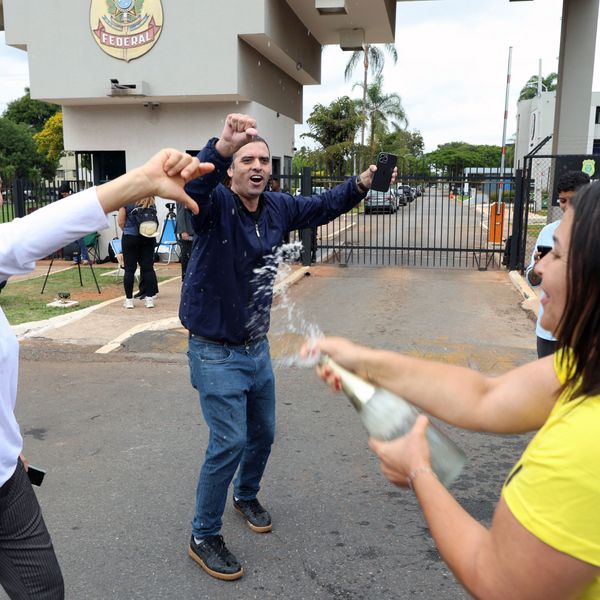'The People Have Awakened': Hundreds of Thousands of Brazilians Rise Up Against the System
Reports of police firing live rounds, close-range pepper spray, and tear gas to disperse the swelling crowds
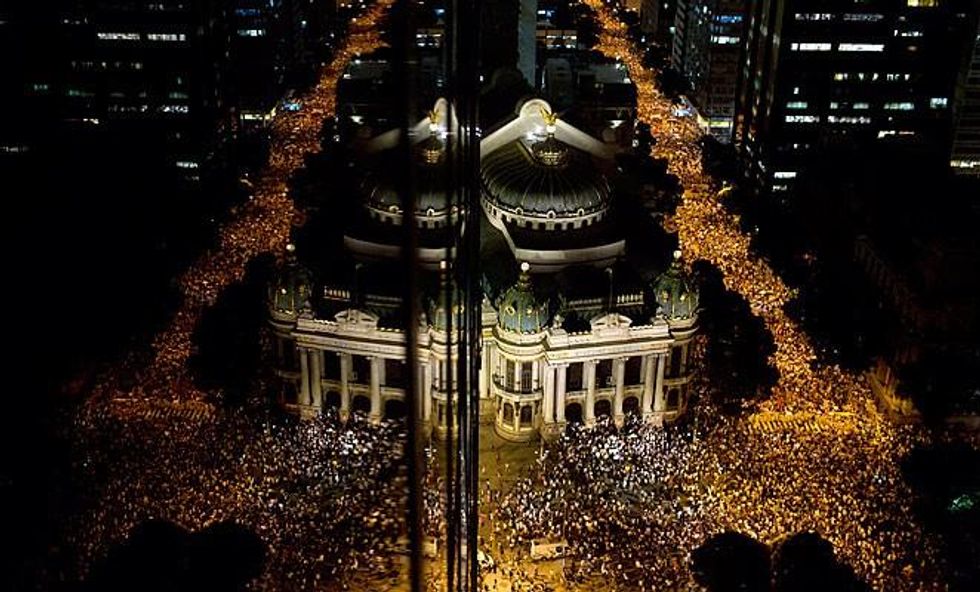
Crowding the streets, protesters waved Brazilian flags, danced and chanted slogans such as "The people have awakened" and "Pardon the inconvenience, Brazil is changing," Reuters reports.
Chaos reigned in some corners as police countered a number of the demonstrations with brute force. In Rio de Janiero, crowds swelled to roughly 100,000 people and police used tear gas, pepper spray and, as evidenced by an video posted on Brazil's Extra 15, live rounds to disperse them.
In the political capital of Brasilia, demonstrators scaled the roof of Brazil's Congress building before storming the interior.
And in the southeastern city of Belo Horizonte, over 20,000 protesters rallied outside of the Confederations Cup football tournament in the second day of protests against the event.
Other protests were reported in Sao Paulo, Curitiba, Vitoria, Fortaleza, Recife, Belem and Salvador.
Though the 'back-breaking piece of straw,' as Nation editor Dave Zirin writes, that sparked the protests was a spike in transportation fares, the protests are largely against the billions of public funds being invested in tourist infrastructure and events such as the upcoming 2014 World Cup and 2016 Olympics while public services and the population continue to suffer.
According to government estimates, hosting the 2014 World Cup will cost the country--where almost one-fifth of the country lives in poverty--approximately $14.5bn. Some tickets are expected to cost more than the country's minimum wage of $300.
"For many years the government has been feeding corruption. People are demonstrating against the system," said Graciela Cacador who was protesting in Sao Paulo. "They spent billions of dollars building stadiums and nothing on education and health."
Thus far, the demonstrations have spread to over 100 towns and cities despite mass police crackdowns. According to AP, more protests are being planned on social media sites for Tuesday in Sao Paulo and Brasilia.
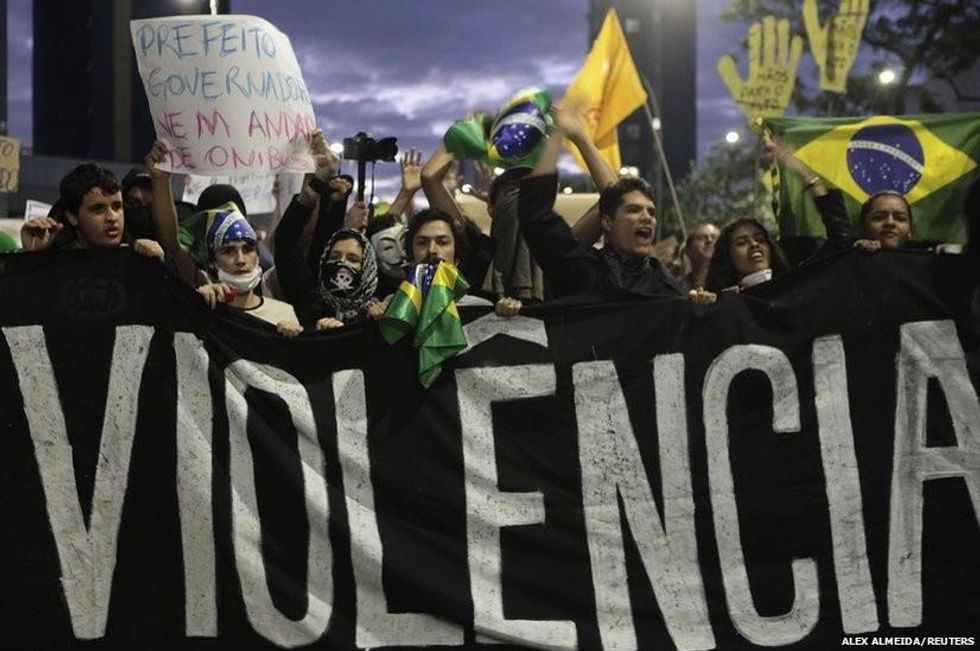
Rio de Janiero:
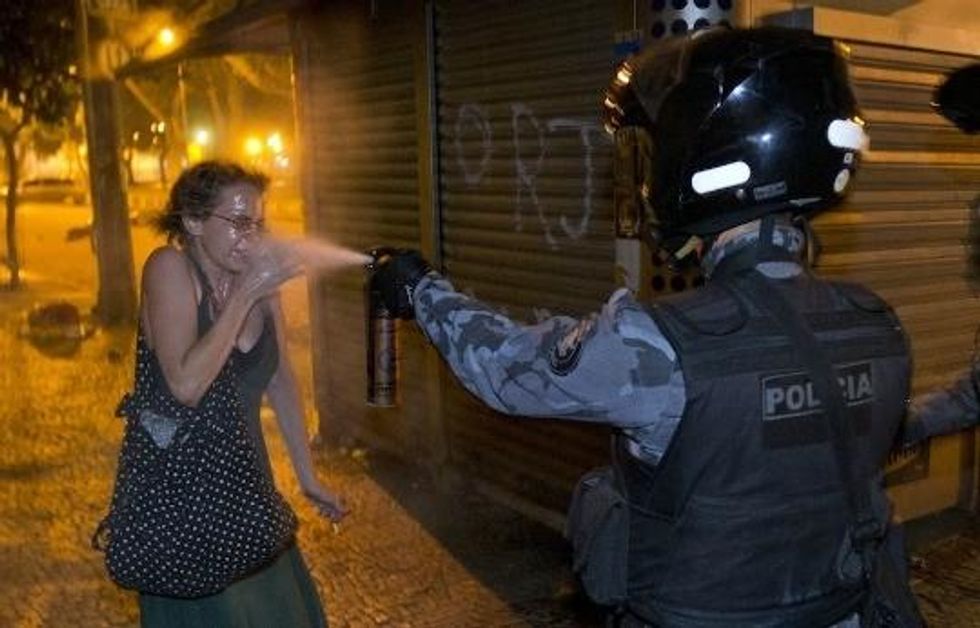
This short video shows the scale of the demonstration in Rio de Janiero.
And this video, posted on Brazil's news site Extra 15, reveals police shooting live rounds at protesters.
Brasilia:
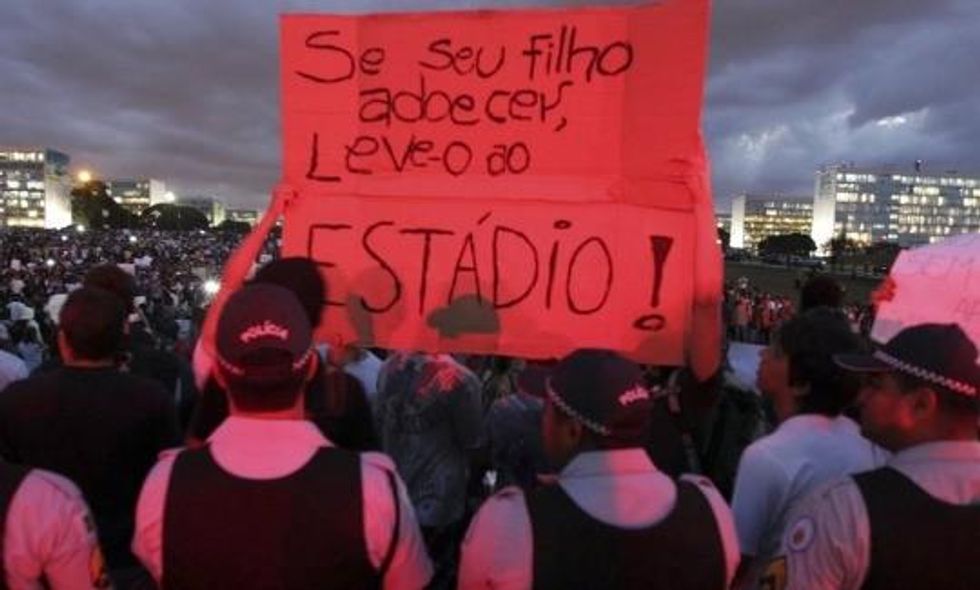
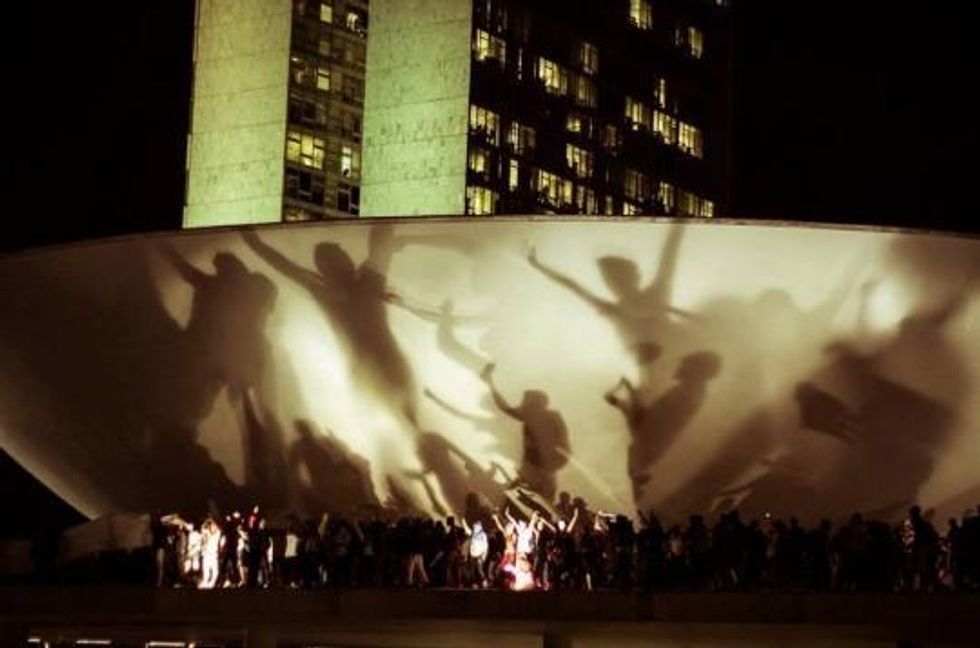
Belo Horizonte:
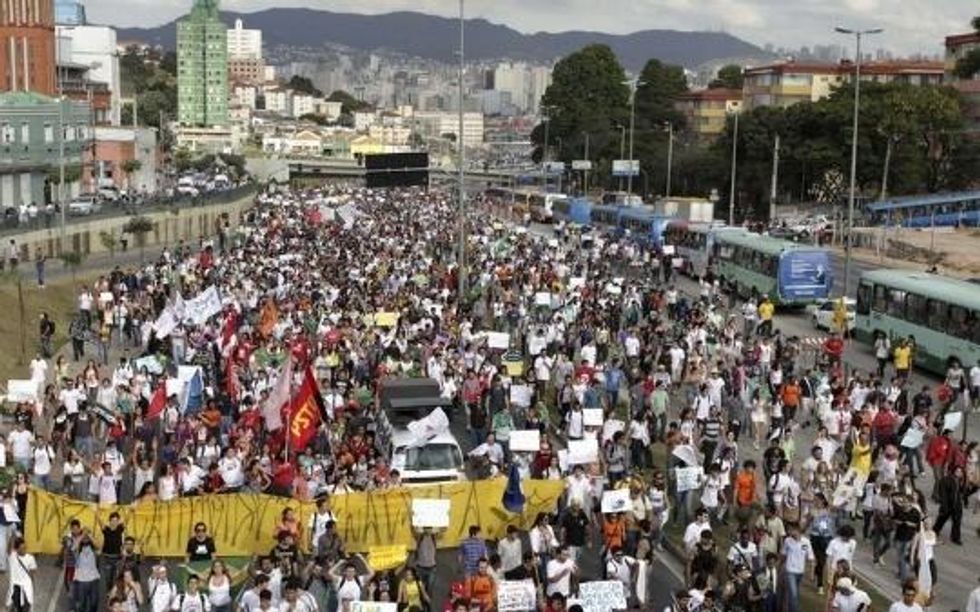
An Urgent Message From Our Co-Founder
Dear Common Dreams reader, The U.S. is on a fast track to authoritarianism like nothing I've ever seen. Meanwhile, corporate news outlets are utterly capitulating to Trump, twisting their coverage to avoid drawing his ire while lining up to stuff cash in his pockets. That's why I believe that Common Dreams is doing the best and most consequential reporting that we've ever done. Our small but mighty team is a progressive reporting powerhouse, covering the news every day that the corporate media never will. Our mission has always been simple: To inform. To inspire. And to ignite change for the common good. Now here's the key piece that I want all our readers to understand: None of this would be possible without your financial support. That's not just some fundraising cliche. It's the absolute and literal truth. We don't accept corporate advertising and never will. We don't have a paywall because we don't think people should be blocked from critical news based on their ability to pay. Everything we do is funded by the donations of readers like you. Will you donate now to help power the nonprofit, independent reporting of Common Dreams? Thank you for being a vital member of our community. Together, we can keep independent journalism alive when it’s needed most. - Craig Brown, Co-founder |

Crowding the streets, protesters waved Brazilian flags, danced and chanted slogans such as "The people have awakened" and "Pardon the inconvenience, Brazil is changing," Reuters reports.
Chaos reigned in some corners as police countered a number of the demonstrations with brute force. In Rio de Janiero, crowds swelled to roughly 100,000 people and police used tear gas, pepper spray and, as evidenced by an video posted on Brazil's Extra 15, live rounds to disperse them.
In the political capital of Brasilia, demonstrators scaled the roof of Brazil's Congress building before storming the interior.
And in the southeastern city of Belo Horizonte, over 20,000 protesters rallied outside of the Confederations Cup football tournament in the second day of protests against the event.
Other protests were reported in Sao Paulo, Curitiba, Vitoria, Fortaleza, Recife, Belem and Salvador.
Though the 'back-breaking piece of straw,' as Nation editor Dave Zirin writes, that sparked the protests was a spike in transportation fares, the protests are largely against the billions of public funds being invested in tourist infrastructure and events such as the upcoming 2014 World Cup and 2016 Olympics while public services and the population continue to suffer.
According to government estimates, hosting the 2014 World Cup will cost the country--where almost one-fifth of the country lives in poverty--approximately $14.5bn. Some tickets are expected to cost more than the country's minimum wage of $300.
"For many years the government has been feeding corruption. People are demonstrating against the system," said Graciela Cacador who was protesting in Sao Paulo. "They spent billions of dollars building stadiums and nothing on education and health."
Thus far, the demonstrations have spread to over 100 towns and cities despite mass police crackdowns. According to AP, more protests are being planned on social media sites for Tuesday in Sao Paulo and Brasilia.

Rio de Janiero:

This short video shows the scale of the demonstration in Rio de Janiero.
And this video, posted on Brazil's news site Extra 15, reveals police shooting live rounds at protesters.
Brasilia:


Belo Horizonte:


Crowding the streets, protesters waved Brazilian flags, danced and chanted slogans such as "The people have awakened" and "Pardon the inconvenience, Brazil is changing," Reuters reports.
Chaos reigned in some corners as police countered a number of the demonstrations with brute force. In Rio de Janiero, crowds swelled to roughly 100,000 people and police used tear gas, pepper spray and, as evidenced by an video posted on Brazil's Extra 15, live rounds to disperse them.
In the political capital of Brasilia, demonstrators scaled the roof of Brazil's Congress building before storming the interior.
And in the southeastern city of Belo Horizonte, over 20,000 protesters rallied outside of the Confederations Cup football tournament in the second day of protests against the event.
Other protests were reported in Sao Paulo, Curitiba, Vitoria, Fortaleza, Recife, Belem and Salvador.
Though the 'back-breaking piece of straw,' as Nation editor Dave Zirin writes, that sparked the protests was a spike in transportation fares, the protests are largely against the billions of public funds being invested in tourist infrastructure and events such as the upcoming 2014 World Cup and 2016 Olympics while public services and the population continue to suffer.
According to government estimates, hosting the 2014 World Cup will cost the country--where almost one-fifth of the country lives in poverty--approximately $14.5bn. Some tickets are expected to cost more than the country's minimum wage of $300.
"For many years the government has been feeding corruption. People are demonstrating against the system," said Graciela Cacador who was protesting in Sao Paulo. "They spent billions of dollars building stadiums and nothing on education and health."
Thus far, the demonstrations have spread to over 100 towns and cities despite mass police crackdowns. According to AP, more protests are being planned on social media sites for Tuesday in Sao Paulo and Brasilia.

Rio de Janiero:

This short video shows the scale of the demonstration in Rio de Janiero.
And this video, posted on Brazil's news site Extra 15, reveals police shooting live rounds at protesters.
Brasilia:


Belo Horizonte:

